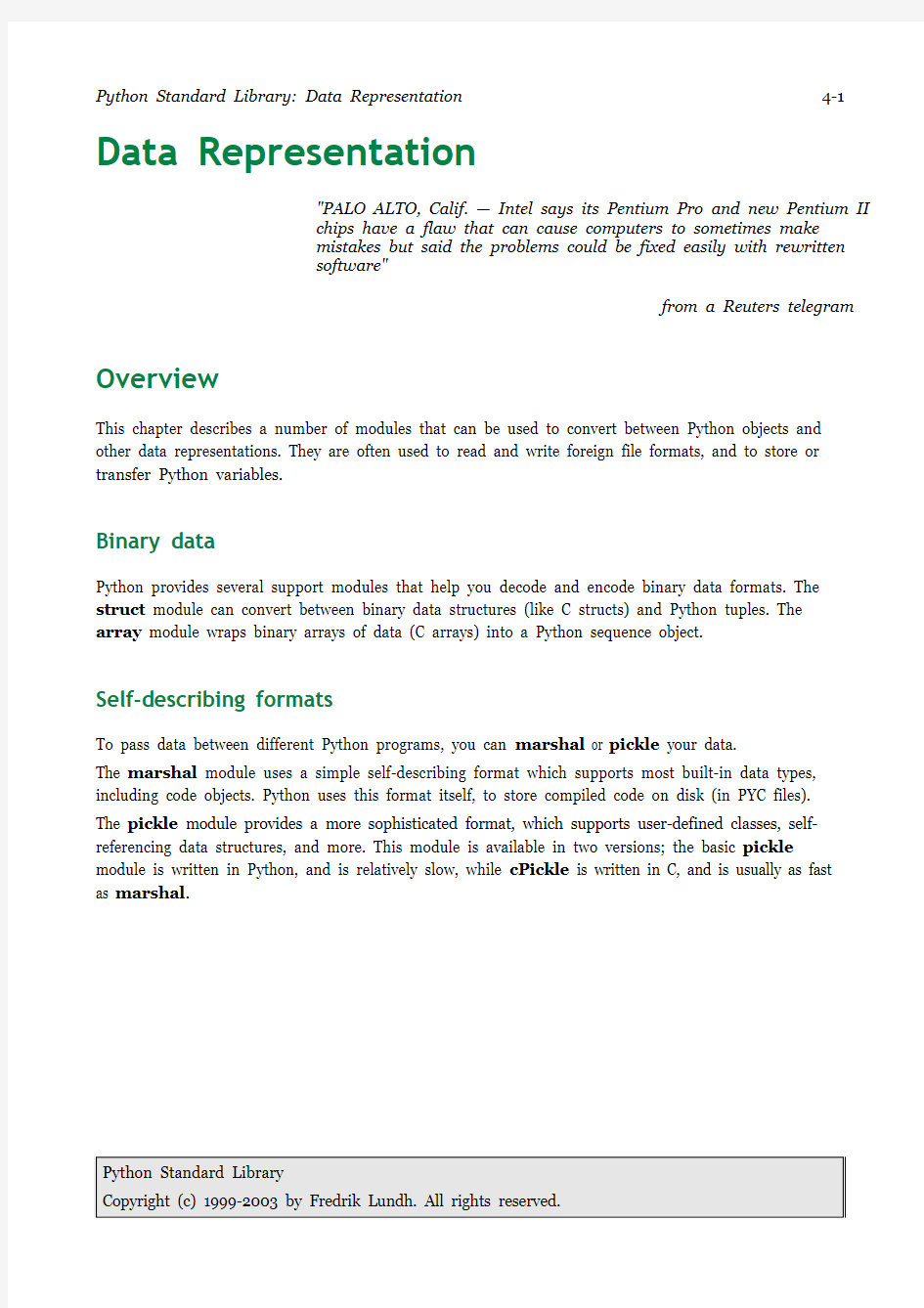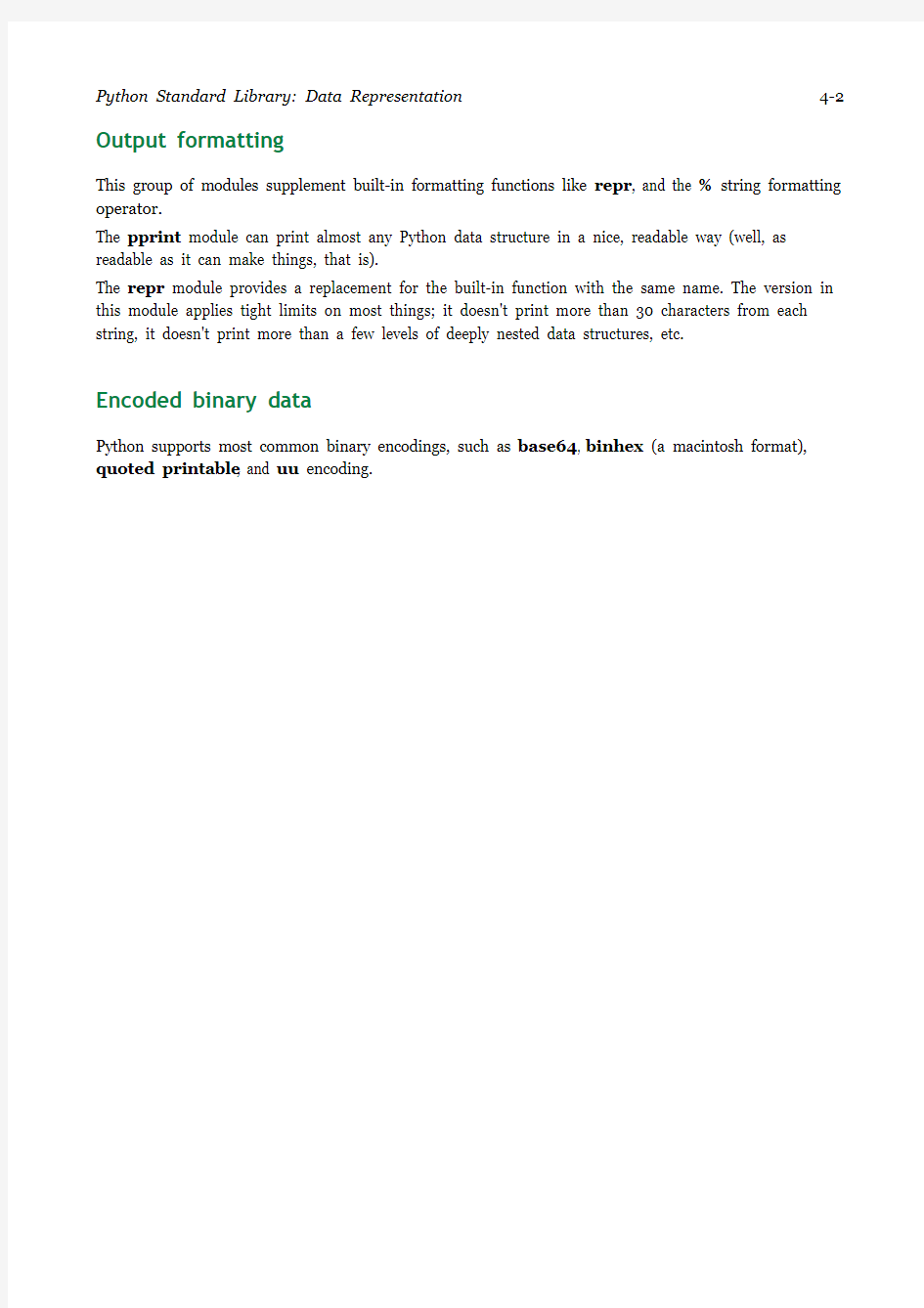

Data Representation
"PALO ALTO, Calif. — Intel says its Pentium Pro and new Pentium II
chips have a flaw that can cause computers to sometimes make
mistakes but said the problems could be fixed easily with rewritten
software"
from a Reuters telegram Overview
This chapter describes a number of modules that can be used to convert between Python objects and other data representations. They are often used to read and write foreign file formats, and to store or transfer Python variables.
Binary data
Python provides several support modules that help you decode and encode binary data formats. The struct module can convert between binary data structures (like C structs) and Python tuples. The array module wraps binary arrays of data (C arrays) into a Python sequence object.
Self-describing formats
To pass data between different Python programs, you can marshal or pickle your data.
The marshal module uses a simple self-describing format which supports most built-in data types, including code objects. Python uses this format itself, to store compiled code on disk (in PYC files). The pickle module provides a more sophisticated format, which supports user-defined classes, self-referencing data structures, and more. This module is available in two versions; the basic pickle module is written in Python, and is relatively slow, while cPickle is written in C, and is usually as fast as marshal.
Python Standard Library
Copyright (c) 1999-2003 by Fredrik Lundh. All rights reserved.
Output formatting
This group of modules supplement built-in formatting functions like repr, and the % string formatting operator.
The pprint module can print almost any Python data structure in a nice, readable way (well, as readable as it can make things, that is).
The repr module provides a replacement for the built-in function with the same name. The version in this module applies tight limits on most things; it doesn't print more than 30 characters from each string, it doesn't print more than a few levels of deeply nested data structures, etc.
Encoded binary data
Python supports most common binary encodings, such as base64, binhex (a macintosh format), quoted printable, and uu encoding.
The array module
This module implements an efficient array storage type. Arrays are similar to lists, but all items must be of the same primitive type. The type is defined when the array is created.
Here are some simple examples. The first example creates an array object, and copies the internal buffer to a string through the tostring method:
Example: Using the array module to convert lists of integers to strings
# File:array-example-1.py
import array
a = array.array("B", range(16)) # unsigned char
b = array.array("h", range(16)) # signed short
print a
print repr(a.tostring())
print b
print repr(b.tostring())
array('B', [0, 1, 2, 3, 4, 5, 6, 7, 8, 9, 10, 11, 12, 13, 14, 15])
'\000\001\002\003\004\005\006\007\010\011\012\013\014\015\016\017'
array('h', [0, 1, 2, 3, 4, 5, 6, 7, 8, 9, 10, 11, 12, 13, 14, 15])
'\000\000\001\000\002\000\003\000\004\000\005\000\006\000\007\000
\010\000\011\000\012\000\013\000\014\000\015\000\016\000\017\000'
The array objects can be treated as ordinary lists, to some extent. You cannot concatenate arrays if they have different type codes, though.
Example: Using arrays as ordinary sequences
# File:array-example-2.py
import array
a = array.array("B", [1, 2, 3])
a.append(4)
a = a + a
a = a[2:-2]
print a
print repr(a.tostring())
for i in a:
print i,
array('B', [3, 4, 1, 2])
'\003\004\001\002'
3 4 1 2
This module also provides a very efficient way to turn raw binary data into a sequence of integers (or floating point values, for that matter):
Example: Using arrays to convert strings to lists of integers
# File:array-example-3.py
import array
a = array.array("i", "fish license") # signed integer
print a
print repr(a.tostring())
print a.tolist()
array('i', [1752394086, 1667853344, 1702063717])
'fish license'
[1752394086, 1667853344, 1702063717]
Finally, here's how to use this module to determine the endianess of the current platform:
Example: Using the array module to determine platform endianess
# File:array-example-4.py
import array
def little_endian():
return ord(array.array("i",[1]).tostring()[0])
if little_endian():
print "little-endian platform (intel, alpha)"
else:
print "big-endian platform (motorola, sparc)"
big-endian platform (motorola, sparc)
Python 2.0 and later provides a sys.byteorder attribute, which is set to either "little" or "big":
Example: Using the sys.byteorder attribute to determine platform endianess (Python 2.0)
# File:sys-byteorder-example-1.py
import sys
# available in Python 2.0 and later
if sys.byteorder == "little":
print "little-endian platform (intel, alpha)"
else:
print "big-endian platform (motorola, sparc)"
'big-endian platform (motorola, sparc)'
This module contains functions to convert between binary strings and Python tuples. The pack function takes a format string and one or more arguments, and returns a binary string. The unpack function takes a string and returns a tuple.
Example: Using the struct module
# File:struct-example-1.py
import struct
# native byteorder
buffer = struct.pack("ihb", 1, 2, 3)
print repr(buffer)
print struct.unpack("ihb", buffer)
# data from a sequence, network byteorder
data = [1, 2, 3]
buffer = struct.pack("!ihb", *data)
# in Python 1.5.2 and earlier, use this instead:
# buffer = apply(struct.pack, ("!ihb",) + tuple(data))
print repr(buffer)
print struct.unpack("!ihb", buffer)
'\001\000\000\000\002\000\003'
(1, 2, 3)
'\000\000\000\001\000\002\003'
(1, 2, 3)
This module converts between Python data types and Sun's external data representation (XDR).
Example: Using the xdrlib module
# File:xdrlib-example-1.py
import xdrlib
#
# create a packer and add some data to it
p = xdrlib.Packer()
p.pack_uint(1)
p.pack_string("spam")
data = p.get_buffer()
print "packed:", repr(data)
#
# create an unpacker and use it to decode the data
u = xdrlib.Unpacker(data)
print "unpacked:", u.unpack_uint(), repr(u.unpack_string())
u.done()
packed: '\000\000\000\001\000\000\000\004spam'
unpacked: 1 'spam'
The XDR format is used by Sun's remote procedure call (RPC) protocol. Here's an incomplete (and rather contrived) example showing how to build an RPC request package:
Example: Using the xdrlib module to send a RPC call package
# File:xdrlib-example-2.py
import xdrlib
# some constants (see the RPC specs for details)
RPC_CALL = 1
RPC_VERSION = 2
MY_PROGRAM_ID = 1234 # assigned by Sun
MY_VERSION_ID = 1000
MY_TIME_PROCEDURE_ID = 9999
AUTH_NULL = 0
transaction = 1
p = xdrlib.Packer()
# send an Sun RPC call package
p.pack_uint(transaction)
p.pack_enum(RPC_CALL)
p.pack_uint(RPC_VERSION)
p.pack_uint(MY_PROGRAM_ID)
p.pack_uint(MY_VERSION_ID)
p.pack_uint(MY_TIME_PROCEDURE_ID)
p.pack_enum(AUTH_NULL)
p.pack_uint(0)
p.pack_enum(AUTH_NULL)
p.pack_uint(0)
print repr(p.get_buffer())
'\000\000\000\001\000\000\000\001\000\000\000\002\000\000\004\322 \000\000\003\350\000\000\'\017\000\000\000\000\000\000\000\000\000 \000\000\000\000\000\000\000'
The marshal module
This module is used to serialize data; that is, convert data to and from character strings, so that they can be stored on file or sent over a network.
Marshal uses a simple self-describing data format. For each data item, the marshalled string contains a type code, followed by one or more type specific fields. Integers are stored in little-endian order, strings as a length field followed by the string's contents (which can include null bytes), tuples as a length field followed by the objects that make up the tuple, etc.
Example: Using the marshal module to serialize data
# File:marshal-example-1.py
import marshal
value = (
"this is a string",
[1, 2, 3, 4],
("more tuples", 1.0, 2.3, 4.5),
"this is yet another string"
)
data = marshal.dumps(value)
# intermediate format
print type(data), len(data)
print "-"*50
print repr(data)
print "-"*50
print marshal.loads(data)
--------------------------------------------------
'(\004\000\000\000s\020\000\000\000this is a string
[\004\000\000\000i\001\000\000\000i\002\000\000\000
i\003\000\000\000i\004\000\000\000(\004\000\000\000
s\013\000\000\000more tuplesf\0031.0f\0032.3f\0034.
5s\032\000\000\000this is yet another string'
--------------------------------------------------
('this is a string', [1, 2, 3, 4], ('more tuples',
1.0,
2.3, 4.5), 'this is yet another string')
The marshal module can also handle code objects (it's used to store precompiled Python modules).
Example: Using the marshal module to serialize code
# File:marshal-example-2.py
import marshal
script = """
print 'hello'
"""
code = compile(script, "